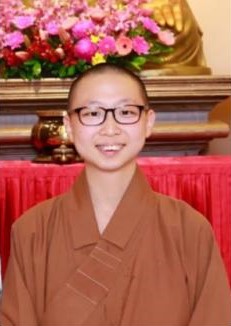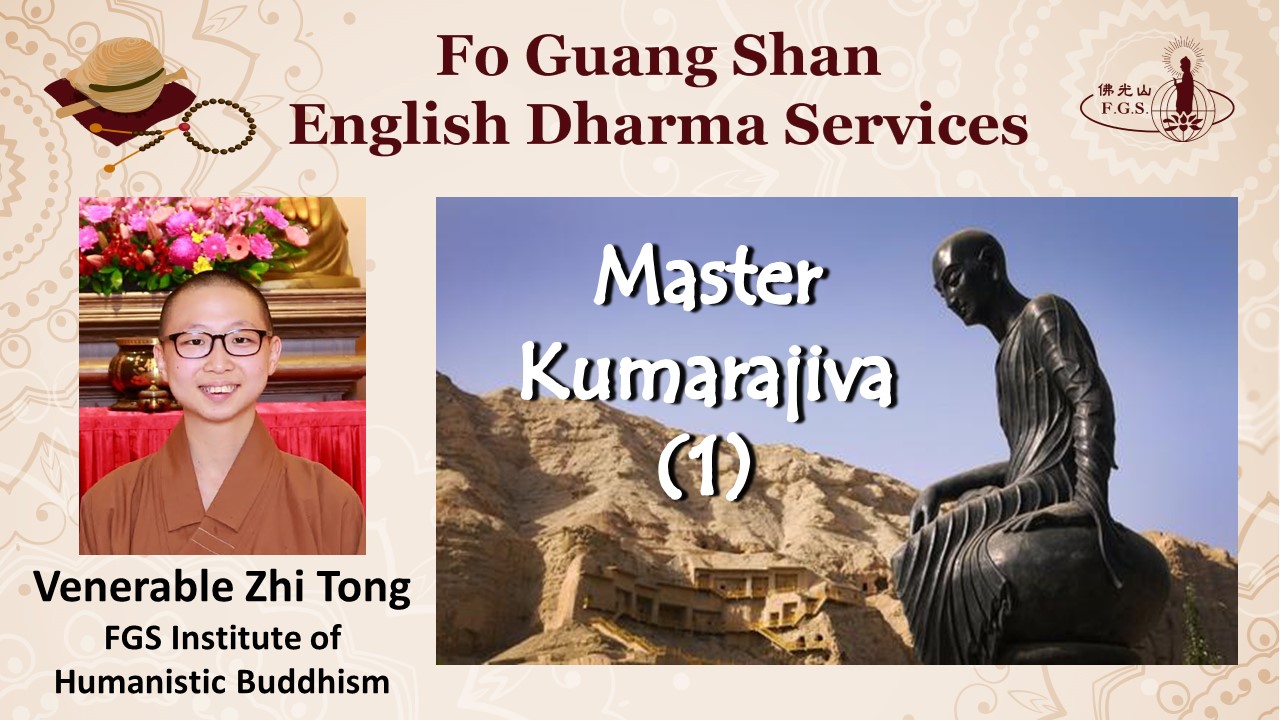
Speaker: Ven. Zhi Tong
Fo Guang Shan Institute of Humanistic Buddhism
I. Introduction
Auspicious greetings! Welcome to a new episode of our weekly Fo Guang Shan English Dharma Services. My name is Zhi Tong, and today I would like to share the story of another great Buddhist master.
Previously, I shared about the life of Master Xuanzang, who was renowned as one of the Four Greatest Buddhist Translators of China. Today, I would like to share another great Buddhist translator of China, and his name is Kumarajiva.
In this series, let us follow along Master Kumarajiva’s journey, starting from the Western Regions where he was born, his renunciation at a young age, his path in learning the Buddha-Dharma, his tumultuous journey to China, and his fame as a great Buddhist translator.
Let us begin our story.
II. Part 1: Birth and Renunciation
The name “Kumarajiva” may be a hint that this Buddhist master was not actually Chinese in origin. Master Kumarajiva was originally from the country of Kucha, which is located in present-day Xinjiang, Mainland China. He was born around the year 344, which means Master Kumarajiva preceded Master Xuanzang for about 250 years.
The union of his parents was a peculiar event. Master Kumarajiva’s father was Kumarayana, and he was originally from India, probably around the Kashmir area. Though he was from a rich family, and descended from a long line of ministers, Kumarayana had no desire for his wealth nor position, and instead renounced as a Buddhist monastic. After his renunciation, Kumarayana left India and traveled to eastwards with the goal of propagating the Buddha-Dharma to the Western Regions and maybe into China.
However, before Kumarayana reached China, he was stopped at the country of Kucha. The king of Kucha was extremely impressed with Kumarayana’s wisdom, and asked him to stay as the national master. One day, the king’s sister, Princess Jivaka, met Kumarayana. She was taken by his intelligence and wished to marry him. It is of course against the Buddhist precept for a monastic to enter into marriage, but the king forced Kumarayana to comply. The marriage resulted in Master Kumarajiva.
Princess Jivaka was an intelligent and perceptive lady. When she was pregnant with Kumarajiva, it was said that she could suddenly speak and understand Sanskrit, the noble Indian language which she previously had no idea of. Moreover, she became wiser and could understand difficult texts. However, after she gave birth, her ability to speak Sanskrit disappeared. Such an omen drew parallel to that of the Buddha’s disciple foremost in wisdom, Sariputra. When Sariputra’s mother was pregnant with him, she also became more intelligent and could engage in philosophical and academic debates. People began to think that this new baby, Kumarajiva, was destined for a great future.[Slide 6] When Kumarajiva was seven years old, one day, his mother Princess Jivaka saw human remains strewn in a burial ground. Suddenly, she was struck by the understanding that life is impermanent, and that the physical body only brings suffering. Princess Jivaka decided to renounce as a Buddhist nun. She asked young Kumarajiva to renounce with her, and the mother and son began their spiritual journey as Buddhist monastics.
III. Part 2: Studying the Dharma
Kumarajiva was an extraordinary child. After he was renounced, he began his learning with the great Buddhist master, Buddhasvāmin. He could memorize the verses of Buddhist texts easily, and understood them quickly. His mother Jivaka took him to visit different places and Buddhist teachers, and before he turned twenty years old, Kumarajiva had completely mastered the teachings of the Smaller Vehicle.
As he grew up, his intelligence and mastery of the Dharma became well-known in the Western regions, and people knew that there was a young but extremely learned bhiksu from the country of Kucha named Kumarajiva. He was invited to give Dharma talks and engaged in philosophical and scholarly debates, which he won. Not only was he learned in Buddhist teachings, he also studied Indian philosophical texts as well as other branches of studies popular of that time.
When he was about nineteen years old, he and his mother Jivaka traveled back to Kucha. Kumarajiva met with the Mahayana Buddhist teacher, Suryasoma. Kumarajiva had never encountered Mahayana texts before, and was startled by the Madhyamaka philosophy of sunyata or emptiness. This idea was a challenge to what he had previously learned and understood, but he could perceive the deep wisdom of the teaching of sunyata.
At the age of twenty, Kumarajiva was of age to take the ordination precepts. He continued his Buddhist studies, now on the Mahayana teachings of Prajnaparamita.
One day, his old teacher, who taught him the teachings of the Lesser Vehicle, came to visit him. As they conversed, Kumarajiva discussed the Mahayana teaching with his teacher. At first, his teacher could not accept it. Mahayana teachings seemed to reject the very truths that he learned! But slowly, the teacher could understand the true meaning of Mahayana teachings, and perceived that realized that Kumarajiva’s understanding of the Buddha-Dharma was more complete and perfect. His teacher said,
“In the past, I was your teacher. But now, you are my teacher.”
This incident spread far and wide, and the fame of Kumarajiva grew and reached even to those of the faraway land of China.
IV. Part 3: A Promise and A Vow
One day, Kumarajiva’s mother said to him,
“You are now learned and accomplished, and my responsibility as your mother has come to an end. I plan to travel to India, to seek the Dharma. What is your future plan?”
Kumarajiva was silent. Finally he said, “Do you have a wish for me?”
Jivaka replied, “With your wisdom and ability, you should propagate the profound teachings of the Buddha in China. Its dissemination in the eastern countries will depend only on you.”
Kumarajiva was startled. China, a country quite far away, with people of different culture and languages. He remained silent.
Jivaka continued, “Does it matter that there will be no personal advantage for you if you propagate the Dharma lands of the east?”
Kumarajiva stirred, his mind made up. He finally replied, “The teachings of the great master are there to serve others and to forget oneself in the process. If one is able to spread the great conversion and awaken the blind masses, then, even if one’s body were burning in a red hot oven, one may suffer but feel no regret.”
Jivaka was very pleased. “Hold firm to this promise. You will become a great teacher of the Dharma.”
The mother and son bade farewell. Jivaka was going westwards to India, while Kumarajiva remained in Kucha, waiting for the conditions that would take him to the eastern lands. As Kumarajiva saw his mother off on top of the city gates, he knew they would never meet again.
Kumarajiva continued to learn and teach. Flowers bloomed and fell, the seasons changed, and he was forty years old.
One day, a royal messenger ran into the royal palace. He was pale and shaken as he knelt before the king.
“An army of seventy-thousand army is coming! It is an army from China!”
Why did a Chinese army come? Will Kumarajiva survive the battle? Will he reach China? Stay tune to next week’s episode to find out!
V. Conclusion
Thank you for tuning in to this episode. May you find joy and peace in the Dharma. Omitofo.

